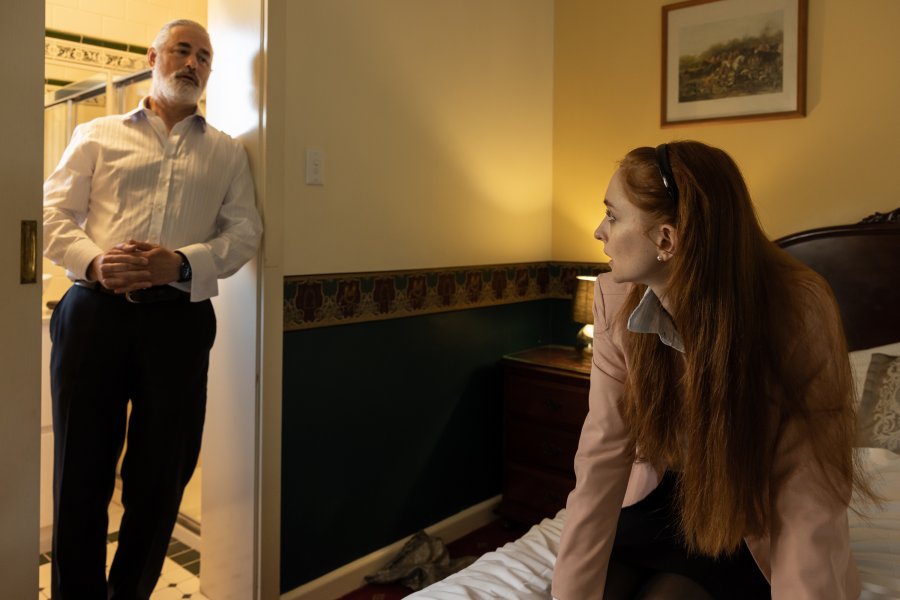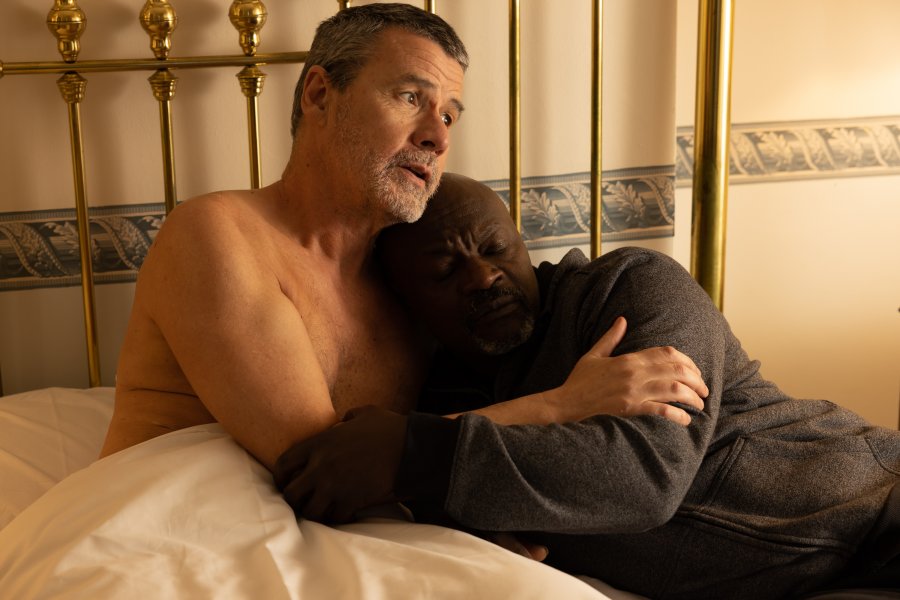By Darby Turnbull
Ignis presented by Anthropocene Theatre Company is one of Fringe’s hottest tickets, having been sold out weeks before their opening I can see how audiences might resort to subterfuge to get into Toorak Manor to experience it.
Written by Daniel Noller and Directed by Bronwen Coleman; the ground floor of the gorgeous historical building has been taken over for a tour of interconnected playlets set against the backdrop of the catastrophic bushfires of 2020 and before the first recorded Covid Cases reached our shores. Not that they’re presence is being prioritized by (most) of the characters, all of whom are engaged in their own torrid, messy interpersonal relationships and the existential ennui both their outer and inner worlds are inspiring.
Each scene features a different exploration of sexual power, violation, transaction, abuse or compromise. The small audience are seated in small spaces, mostly bedrooms to bear witness.
Bronwen Coleman directs with minute emotional restraint, guiding her actors through the subtlest of emotional shifts and interactions, encouraging whole histories to emerge via flickers in the eyes or movements in the hands. Like all theatre there is some suspension of disbelief; aside the emotional realism, we learn that the opulence of our surroundings don’t always reflect the living situations of the characters. However the set dressings are wonderfully revealing, I took special pleasure in taking in books on bedside tables, what kinds of glasses and luggage the characters used (Alex Marshall did the props)
Noller’s text is a daisy chain of relationship pairings, two will share a scene and then one of them will introduce us to a new pairing and so forth. This is not the kind of text that offers resolutions and getting too invested in a character comes with the condition you might not see them again. They’re moments in time, to sit with and then move on. His dialogue is often pensive and thoughtful with some clear insights into the balances of power that exist between intimate relationships. Though his dialogue can sometimes come across as didactic, distracting from the realism, too my ear it felt a bit like being told how interpret a situation rather than fully trusting the audiences emotional instincts. When the writing, directing and performances are all aligned the tension is palpable.

The first 4 scenes viscerally capture our preconceived anxieties about women alone with men, especially in hotel rooms. Our first, Jordan (Kulan Farah) has picked up Samantha (Catherine Morvell) for a tryst. He’s an academic, barely getting through his thesis who’s fetishized the idea of a tortured intellectual picking up a sex worker for a depraved connection as ‘research’. Samantha, a sex worker who works from the street (whose backstory we’ll hear more about later) is professional, clear about her boundaries and trying to keep to the task at hand whereas Jordan’s deflections become more unhinged as he dehumanizes her in increasingly frightening ways. Farah is genuinely chilling in his depiction of the danger lurking beneath men who feel emasculated and his pathetic attempts to possess Samantha. Morvell is magnetic navigating each new change in dynamic and the scene becomes a taut thriller in just how and if Samantha will get away from this man intact.
After Samantha exits, Amy (Pia O’Meadhra) Jordan’s girlfriend enters and it becomes a relationship drama where he gets to be ‘sweet’ yet misunderstood boyfriend to her assertive, proactive career oriented girlfriend whose schedule is so finite she needs to schedule sex. Noller exerts some wry comedy out of these two trading barbs and expectations. A slight reprieve from the scene before but with the grim knowledge that we know what Jordan is capable of.
Next we follow Amy, a political aide to the ‘Leader of the Opposition’, James (Sebastian Gunner). Again a scene we’re all too familiar with, they have a business meeting, he praises her, gives her a promotion at work and makes an inappropriate sexual advance she has no intention of reciprocating. Gunner and O’Meadra do fraught work together in this section, this is where Noller’s use of tropes really shine because this situations and the way it’s handled is so familiar, they could all share the same script. Gunner is benignly threatening, suavely trying to manipulate the situation, subtly blocking her exit, negotiating, gas lighting her, making excuses; O’Meadra is extraordinary in her transition from cocky, cynical smooth operator to trying to navigate her response to the violation in real time; disgust, humiliation, fear, degradation. Her political skills no match for a powerful man who has decided she’s a threat to his reputation.
Next we’re introduced to James with his wife, Alison (Clare Larman) as he warns her what’s coming while shamelessly lying to her. Noller remains sickening in his impassive manipulation and Larman works wonders with internally compromising with herself what she’s going to choose to believe and how she’ll move forward.
Larman, like O’Meadra is incredible at creating two distinct energies in both her scenes. The next an overnight visit to her old friend and lover Rita (Mikhaela Ebony) in this scene she’s sensual and vivacious and brazenly seductive in reconnecting her teenage romance. Ebony is staunchly subtle in her inability to give in to something she desires but is conflicted about.

As we see, she has problems with her own. Her husband Gary (Jordan Fraser-Trumble) is a firefighter working on the frontlines and she’s irate at his disengagement from the family especially in light of their daughter’s (Samantha from scene 1) run away from home. Ebony conveys well worn frustrations and anguish and Trumble is a study of inarticulate masculinity and traumatized by what he’s witnessing and his part in fighting it.
Next we see him in a hospice being treated by Rachel (Sophie Muckart) a nurse going through a crisis of fate and hiding it behind wry humor. Muckart takes us to the next scene to meet her husband, local conservative Pastor (Ismail Taylor-Kamara) both of whom have secrets they’re not sharing and expertly evading. Muckart plays Rachels’ sheer emotional exhaustion with quiet poignancy and how that exhaustion has led to a frustrating apathy. I won’t reveal what but her actions result in a murky consent violation that was deeply uncomfortable in how offhand it was.
Taylor-Kamara uses is considerable charm to disarm both her and the audience from his own vulnerabilities. Which as we see, he’s gay, and having an affair with Antony (Tim Clarke). Taylor-Kamara is shattering in his deeply internalized self-hatred and punishment of his own desire. Clarke is gorgeously gentle as Antony, who seems to be the characters chilliest character. Samantha shows up at his door and he treats her with the kind of gentleness and grace that we haven’t seen from any of the other characters.
Each section will undoubtedly appeal to different audience members. For me when it hit, it hit hard but other times I respected rather than engaged with what was being portrayed. I found myself desiring a bit more emotional innovation within the scenes, there is strength in finding new ways to play the same notes but some, deeper subtler innovations to the dynamics in lieu of hyper verbosity may have interrogated the themes with more nuance.
The character of Samantha for example, whilst she has agency has the plot stacked against her in what she has to represent and can come across as a sketch made up of preconceived ideas about who she is and what sex work is rather than a full- fledged character.
However, it is a satisfyingly written, immersive piece of theatre with a troupe of actors doing beautiful work at their most restrained and natural.

Special mention must also go to our indispensable guide and usher Caitlin Langridge and Fia Softing, who lead us through each transition with smooth efficiency; rare gems in the world of independent theatre.
Ignis made me feel sordid, tainted by association and in need of a shower, it’s fantastic.
Images: Greg Elms





